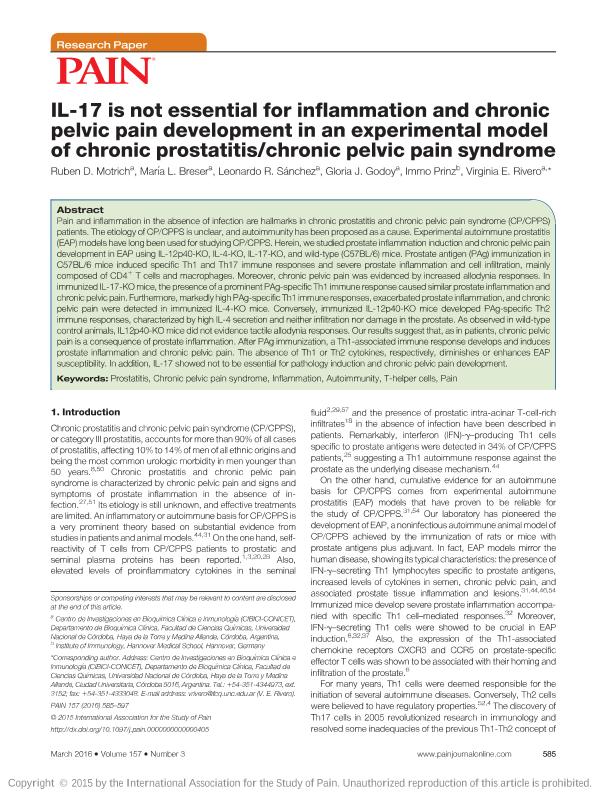Artículo
IL-17 is not essential for prostate inflammation and chronic pelvic pain development in an experimental model of chronic prostatitis/chronic pelvic pain syndrome
Motrich, Ruben Dario ; Breser, Maria Laura
; Breser, Maria Laura ; Sanchez, Leonardo Rodolfo
; Sanchez, Leonardo Rodolfo ; Godoy, Gloria Janet
; Godoy, Gloria Janet ; Prinz, Immo; Rivero, Virginia Elena
; Prinz, Immo; Rivero, Virginia Elena
 ; Breser, Maria Laura
; Breser, Maria Laura ; Sanchez, Leonardo Rodolfo
; Sanchez, Leonardo Rodolfo ; Godoy, Gloria Janet
; Godoy, Gloria Janet ; Prinz, Immo; Rivero, Virginia Elena
; Prinz, Immo; Rivero, Virginia Elena
Fecha de publicación:
11/2015
Editorial:
Elsevier Science
Revista:
Pain
ISSN:
0304-3959
e-ISSN:
1872-6623
Idioma:
Inglés
Tipo de recurso:
Artículo publicado
Clasificación temática:
Resumen
Pain and inflammation in the absence of infection are hallmarks in Chronic Prostatitis/Chronic Pelvic Pain Syndrome (CP/CPPS) patients. The etiology of CP/CPPS is unclear and autoimmunity has been proposed as a cause. Experimental Autoimmune Prostatitis (EAP) models have long been used for studying CP/CPPS. Herein, we studied prostate inflammation induction and chronic pelvic pain development in EAP using IL-12p40-KO, IL-4-KO, IL-17-KO, and wild type (C57BL/6) mice. Prostate antigen (PAg)-immunization in C57BL/6 mice induced specific Th1 and Th17 immune responses and severe prostate inflammation and cell infiltration, mainly composed of CD4+ T cells and macrophages. Moreover, chronic pelvic pain was evidenced by increased allodynia responses. In immunized IL-17-KO mice, the presence of a prominent PAg-specific Th1 immune response caused similar prostate inflammation and chronic pelvic pain. Furthermore, markedly high PAg-specific Th1 immune responses, exacerbated prostate inflammation, and chronic pelvic pain were detected in immunized IL-4-KO mice. Conversely, immunized IL-12p40-KO mice developed PAg-specific Th2 immune responses, characterized by high IL-4 secretion, and neither infiltration nor damage in the prostate. As observed in wild type control animals, IL12p40-KO mice did not evidence tactile allodynia responses. Our results suggest that, as in patients, chronic pelvic pain is a consequence of prostate inflammation. After PAg immunization, a Th1 associated immune response develops and induces prostate inflammation and chronic pelvic pain. The absence of Th1 or Th2 cytokines respectively diminishes or enhances EAP susceptibility. In addition, IL-17 showed not to be essential for pathology induction and chronic pelvic pain development.
Palabras clave:
Pain
,
Inflammation
,
Chronic Prostatitis
,
Chronic Pelvic
Archivos asociados
Licencia
Identificadores
Colecciones
Articulos(CIBICI)
Articulos de CENTRO DE INV.EN BIOQUI.CLINICA E INMUNOLOGIA
Articulos de CENTRO DE INV.EN BIOQUI.CLINICA E INMUNOLOGIA
Citación
Motrich, Ruben Dario; Breser, Maria Laura; Sanchez, Leonardo Rodolfo; Godoy, Gloria Janet; Prinz, Immo; et al.; IL-17 is not essential for prostate inflammation and chronic pelvic pain development in an experimental model of chronic prostatitis/chronic pelvic pain syndrome; Elsevier Science; Pain; 157; 3; 11-2015; 585-597
Compartir
Altmétricas
Items relacionados
Mostrando titulos relacionados por título, autor y tema.
-
Breser, Maria Laura ; Salazar, Florencia; Rivero, Virginia Elena ; Motrich, Ruben Dario (Frontiers Research Foundation, 2017-07-31)



